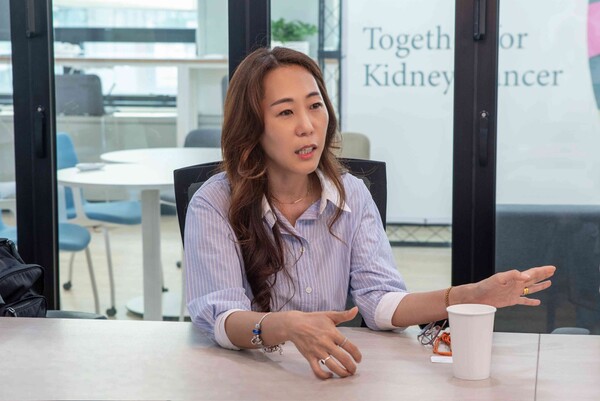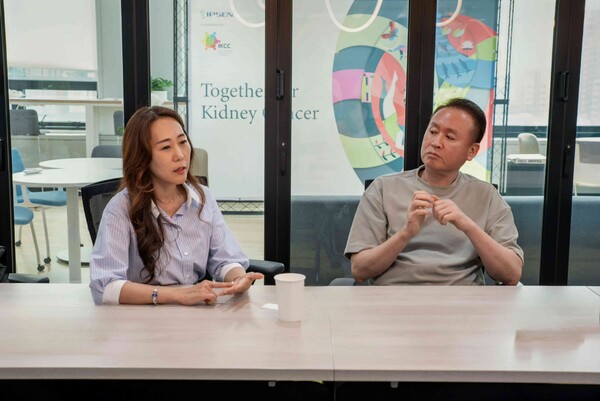Last Thursday, the third Thursday of June, was World Kidney Cancer Day designated by the International Kidney Cancer Coalition (IKCC). This year's theme set by the IKCC was “Listening,” emphasizing the importance of full communication between kidney cancer patients and healthcare providers about their treatment, their lives, and shared decision-making about their care.
When you are sick, who do you turn to the most? Your doctor – who else could it be? They are the ones who will cure you of your illness. When you're a cancer patient, every word you hear from your doctor is even more important, so you spend hours and days searching for a doctor you know is competent. However, you often feel it frustrating to have too little time in the doctor's office to ask all your questions.
In particular, Korea's “three-minute consultation” system is not enough to fulfill the needs of cancer patients who have waited a long time to see a doctor who they believe can save their lives. Therefore, seeing a doctor who takes the time to explain their condition in detail and answer all their questions helps them feel more confident that they can survive.

"I had a lot of questions about the disease and the treatment process, but I couldn't communicate well with the medical staff," said Baek Jin-young, head of the Korea Kidney Cancer Association, who spoke to Korea Biomedical Review on World Kidney Cancer Day. "I created this association because I had wanted to establish an organization that would not only help patients and their caregivers share their experiences but also share and educate proper information about the disease."
Korea Biomedical Review asked Baek, who has led the association due to her husband's battle with kidney cancer, about the role of the organization, the current treatment environment for kidney cancer patients in Korea, and what needs to be improved.
Question: How did you come to establish the Korea Kidney Cancer Association?
Answer: My husband was diagnosed with kidney cancer in 2004. I had a lot of questions about the disease and the treatment process, but the doctor didn't explain it in detail. The doctor said the surgery went well, so I thought everything was fine. After that, however, I was frustrated with the lack of communication with the medical team, so I went to another hospital. After a year and a half, they told me that the cancer had metastasized to both lungs. They told me there was nothing more they could do for us and that I should tell them what I wanted. However, how could patients and their guardians tell them what I wanted if I didn't know anything about the disease?
That's when I started visiting professors and studying kidney cancer. That was the first time I realized that there were no drugs for kidney cancer. I was curious about overseas treatments, so I Googled and found out about the Nexavar and Suten trials and called the pharmaceutical companies. The hospital we went to was also doing it, but the doctor didn't tell us about it. I started this association because I felt I needed to be better informed about cancer. I wanted to create an organization where patients and caregivers could not only share their experiences but also share and educate proper information about the disease.
Q: What does your association do?
A: As a caregiver for my husband's kidney cancer, I experienced the entire process from diagnosis to treatment and hospice. I went through every stage of the disease because it was so severe that there was no place where it hadn't metastasized. Based on my experience, I share information helpful for patients and caregivers, how to communicate with medical staff, where to connect with medical staff and information on needs outside of treatment through solidarity with overseas organizations.
Although there have been many new drugs for kidney cancer since 2006, there are still many uncovered drugs with little guarantee of effectiveness. Recent research data shows that combinations of drugs are more effective than single drugs, so I told patients to consider this as well. Kidney cancer patients are faced with off-label drugs in the second or third line. It's also a difficult stage financially, so it's important to consider the family's economic situation.
In honor of World Kidney Cancer Day on June 20, the patient's association held a medical seminar last Saturday that attracted more than 60 people. The time patients can talk to doctors in the clinic is too short. The seminar was a time to hear stories that were not told even though there were so many questions. I'm glad that I could give them practical information, such as why one patient was prescribed drug A and the other was prescribed drug B, although they were the same kidney cancer patients.
Q: What do you think is the most urgent thing to be improved in kidney cancer care?
A: It's reimbursement. Kidney cancer is treated with chemotherapy starting from stage 4. However, patients don't know which drugs are right for them. I would like to see a system that allows patients to continue using effective drugs. Especially for non-transparent cell cancer, it is almost impossible to conduct clinical trials due to the small number of patients. It's not easy to get into the reimbursement system because of the lack of clinical trials. I would like to see the reimbursement issue resolved quickly for the sake of patient choice.

Q: You recently organized the first International Kidney Cancer Coalition’s international conference (IKCC Summit) in Asia. You must have met kidney cancer patients from many countries. Is the situation in foreign countries much different from Korea’s?
A: Regarding the treatment environment, foreign doctors and patients have a horizontal relationship in having conversations. Medical professionals who collaborate with our association are exceptions but there is still a perception that patient organizations do not know what they talk about. In this respect, foreign patient organizations are perceived as partners who can collaborate with medical staff. There is a lot of dialogue with patients in the clinic, and they are supported to receive psychological counseling. Overseas, many areas are more patient-centered. Concerning other institutional aspects, Korea has a good health insurance system so I don't feel much difference except for non-reimbursement issues.
Q: Are there any inconveniences or things that need to be improved besides the reimbursement for drugs?
A: At a medical seminar organized by our association last Saturday, we discussed side effects management. Side effects are different for every patient, but it is difficult to manage them in the current medical system. Side effect management is very important in chemotherapy, and our association can play a role in collecting and sharing these cases, so I hope that medical institutions and pharmaceutical companies will pay attention to side effect management based on these data.
The person that patients can rely on the most is their doctor, but it depends on which doctor they see. The time spent in the doctor's office is often too short for patients to ask all their questions, so they appreciate a doctor who explains in detail what is going on and gives them time to ask questions. Of course, I understand doctors who don't have time for lunch and see patients nonstop all day. Also, many patients experience side effects from chemotherapy drugs, and I wish there were a system to manage and mitigate these side effects in an integrated way. Many patients give up on chemotherapy because of this. (according to Cho Jae-hyuk, a patient who was also on hand during the interview)
Q: Does your organization have any plans for the World Kidney Cancer Day theme of "Listening"?
A: Usually, we start the campaign the week before May, but this year we started late due to the medical turmoil. We will start on June 20, World Kidney Cancer Day. To communicate well with doctors, patients also need to communicate well, but doctors and patients don't understand each other very well. We need a middle ground, and I think that's the role of the patient organization, and we're trying to solve it one by one.
The future goal is to find a way to increase insurance benefits. The basic role of the patient association is to communicate the process of treatment information to patients and their caregivers. We want them to be informed and empowered to make their decisions.
Specifically, we are planning a symposium on “immuno-oncology drug combinations and reimbursement.” Since kidney cancer encompasses all immuno-oncology drugs, we want to hear the thoughts of healthcare providers and discuss ways to improve the process.
Q: How many cancer patients are harmed by unscientific alternative therapies that lure them in?
A: It's very serious. We say “no” to people who want to do something else when scientific treatments are available. The result is that the anxiety that comes from not being able to continue with chemotherapy is causing patients to turn to alternative areas. Some people take advantage of patients' anxiety, and their number is increasing.
Q: Recently, there has been a medical vacancy due to the medical school enrollment quota increase. For patients with serious diseases such as cancer, delays in treatment can lead to death, leading to considerable repercussions.
A: I don't know about other diseases, but in the case of kidney cancer, there have not been many delays in treatment. I've had people who were supposed to have chemotherapy next week and it was pushed back a month, but if you call the hospital, they reschedule it so it doesn't interfere with your treatment. The medical staff adjusts the time according to the patient's condition, so I am very grateful. It's not a big deal for existing patients, but it's a challenge for new patients because hospitals don't accept new patients. In particular, many people are looking forward to clinical studies, but because clinical studies are fixed, they are delayed and cannot participate in them, so this is a problem.

